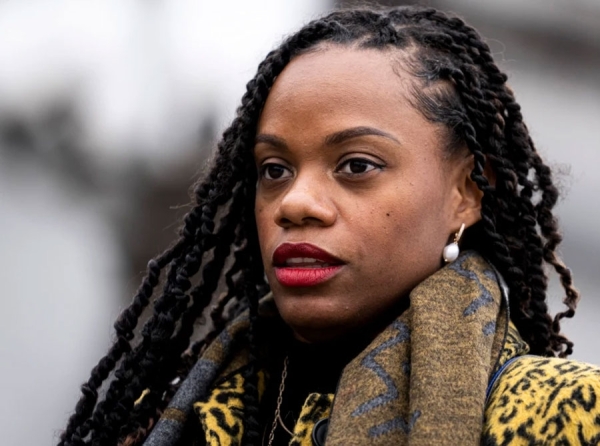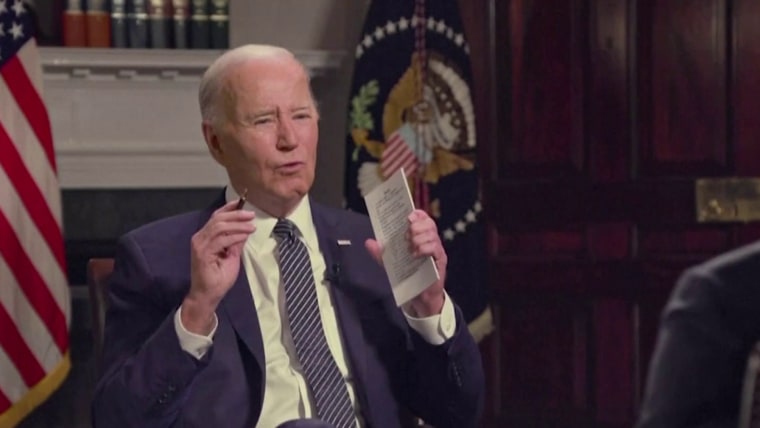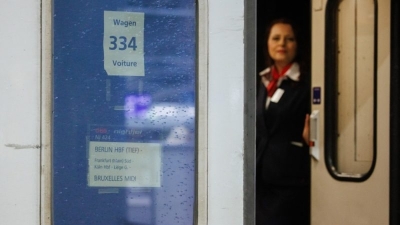The Jewish vote could play a huge role in 2024.

PITTSBURGH — In the heart of one of America’s most prominent historically Jewish neighborhoods, Dan and Baila Cohen keep the front entrance of their 70-year-old Judaica store locked during business hours.
It’s not how they’d prefer it. But in light of Hamas’ Oct. 7 terrorist attack in Israel, Israel’s ongoing military campaign in Gaza and tensions at home, they said, the Jewish Federation of Greater Pittsburgh told them they needed to be vigilant about who enters their business.
“That’s the reality of the world,” Dan Cohen said.
It’s not the first time they’ve had to take additional safety precautions. The couple completed their purchase of Pinsker’s Books and Judaica in Pittsburgh’s Squirrel Hill neighborhood in 2018 just days after a white supremacist gunned down 11 worshippers at the Tree of Life synagogue a few blocks away in the deadliest antisemitic attack in American history. But this time feels different.
“Oct. 27 really unified” Squirrel Hill and Pittsburgh, Baila Cohen said of the Tree of Life massacre. “Oct. 7 … really started polarizing the community itself, because that’s when we started seeing much more of the infighting and conflicts.”
Conversations with more than 30 political strategists, activists and voters outlined how that tension has put Jewish voters in an unfamiliar spot ahead of the 2024 elections: on the front lines of the fight for control of the White House and Congress. Nowhere is that more apparent than in Pennsylvania, the swing state with the largest Jewish population — about 300,000 voting-age Jews in a state President Joe Biden won by roughly 80,000 votes in 2020.
What’s more, the congressional district that includes Squirrel Hill features a primary Tuesday that is among the first electoral tests of sentiment on both sides of the conflict in Gaza and concerns over rising antisemitism in the U.S. Democratic Rep. Summer Lee, a “squad”-aligned progressive critical of Israel’s handling of the war and one of the first lawmakers to call for a cease-fire last year, will face Bhavini Patel, an Edgewood Borough Council member who has painted Lee’s advocacy as harmful to Biden’s re-election chances and out of step with her district.
“We have communities that are hurting. The Jewish community is one of them. And there are people who are … not going to agree 100% on everything that you say,” Lee said in an interview, adding she has been “very clear and very upfront” about her cease-fire position. “I have condemned Hamas. We’ve worked with the families of hostages; we’ve done everything that I think is necessary to do that. And at the end of the day, we disagree.”
A dozen Jewish voters in the district who spoke to NBC News, whether supporting Lee or Patel, almost universally said their votes in November would be driven by issues beyond Israel, saying that the Jewish electorate isn’t a “monolith” and that democracy, abortion rights and the economy weighed heavily on them.
Most Jewish voters in Squirrel Hill — and nationally — align with the Democratic Party. A Pew Research Center survey released this month found 69% of Jews leaning Democratic, while 29% aligned Republican.
But Republicans aren’t looking for a massive defection. GOP strategists and Republicans involved in Jewish outreach expressed confidence that Democratic divisions over Israel will help move a small but potentially significant number of Jewish voters into their camp in battleground states like Pennsylvania, Nevada and Arizona. They pointed to surveys showing President Donald Trump’s improved performance among Jews in 2020, compared with his 2016 race, as evidence of a slow shift that could continue.
“Before Oct. 7, most candidates would say this issue is so messy. … It’s not necessarily something that I want to focus on in my campaign,” said Tali deGroot, political director for the liberal Jewish group J Street. “And I would have said, ‘Absolutely, this isn’t a voting issue for people we poll year after year.’ And it’s too soon to tell if it’s going to be a voting issue. But not talking about it is not an option."

’Playing with fire’
In Pennsylvania’s 12th Congressional District, the war and its impact at home took center stage last week at a campaign event where Lee launched her “Jews for Summer” coalition.
Lee talked about “how our liberation is tied together,” whether “in western Pennsylvania or the West Bank.” She spoke about how the district still needs “deep healing” following both the Oct. 7 attack and the killing of Jews at Tree of Life. And she framed her primary as a covert Republican effort to divide a multiethnic, cross-religious support base by using splits over Israel.
“There are people who have to convince you that the only reason why I could believe in peace is because I actually hate some of our neighbors, not because we love each other,” said Lee, who overcame significant spending by groups aligned with the American Israel Public Affairs Committee, a pro-Israel lobbying group, when she narrowly won her first congressional primary in 2022.
Israel didn’t have the salience it does now. Lee has accused the Israeli government of committing “war crimes," called for an end to unconditional military aid to the country and joined a handful of other progressives in mid-2022, before the Israel-Hamas war, who voted against a GOP-led resolution that said Israel wasn’t “a racist or apartheid state.” She has also condemned Hamas’ attack and repeatedly spoken out against antisemitism.
On Saturday, she joined 36 Democrats and 21 Republicans in voting against an aid package to the country, which passed overwhelmingly. She and Rep. Scott Perry, R-Pa., were the only Pennsylvania members to vote against it.
Her early call for a cease-fire is now largely in step with Democratic voters, but Jewish leaders have expressed unease with how Lee and some of her allies have discussed the issue. Last month, more than 40 Pittsburgh-area rabbis wrote in a letter, after an earlier meeting with Lee, that she has “continued to use divisive rhetoric” that the group has at times “perceived as openly antisemitic.”
Their letter didn’t describe that rhetoric, but it said Lee opposed House measures to condemn antisemitism and criticized her calls for an “unconditional cease-fire from one side,” which they said “devalues the lives and beliefs of one group.” They also called on her to return campaign contributions “from people who have voiced virulently antisemitic sentiments.” In February, Lee canceled an appearance before the Philadelphia chapter of the Council on American-Islamic Relations amid backlash over other speakers’ antisemitic and homophobic remarks, which she condemned.
Karen Hochenberg, president of a local Democratic club that has endorsed Patel, said Lee has lost considerable support in the Jewish community, including hers. While Hochenberg aligns with Lee on many issues, she and others have been “hurt” by some of her votes and actions, and she said she wished Lee had been more vocal about the Hamas attack.
“Many Jews now are starting to question where are we on the road map of intersectionality,” Hochenberg said. “Jews are starting to really take a look at how comfortable we are and if we’re going to send candidates to Congress who’s going to be there and have the voice of the Jewish community in mind, as well.”
Jeremy Kazzaz, a Pittsburgher leading a new Jewish voter group, said the pushback Lee faces isn’t so much about Israel but about what he called an unwillingness to meet with constituents who don’t share her views.
“She finds the individuals who agree with her already who are anti-Zionist, who are extremist or fringe of the left of politics, and she will hold them up on a pedestal while spreading things” that, Kazzaz said, make local Jews “less safe.”
But overall, Lee is looking stronger in her district now than in her first run, even to some opponents. AIPAC-linked groups aren’t getting involved in her primary this time. Lee has framed her campaign around efforts to counter MAGA Republicans and bring federal dollars to the district.
Jonathan Mayo, a Squirrel Hill resident co-leading the Jews for Summer coalition, told NBC News he aligns with Lee’s position on Israel but emphasized that he’s not a single-issue voter.
“It is so important to speak out and show that there are members of the Squirrel Hill Jewish community who still very much support Summer Lee,” he said.



